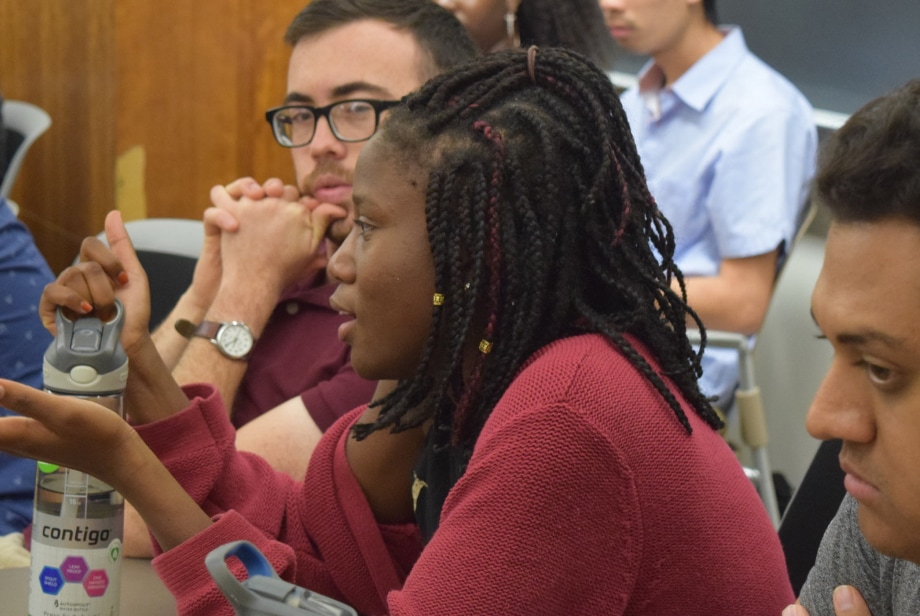Prevention of Prison Pipelines
Cutting off the foster care-to-prison pipeline.
Children who have been in foster care are disproportionately at risk of being incarcerated, a phenomenon often referred to as the “foster care-to-prison pipeline.” An estimated 25% of former foster youth will become involved with the criminal justice system within two years of leaving foster care. At NFYI, nearly half of our members report having juvenile justice or criminal system involvement, highlighting the deeply embedded and systemic nature of this issue.


The Intersection of Foster Care and Juvenile Justice
The intersection between the foster care and juvenile justice systems disproportionately impacts youth of color. Black children are overrepresented in both systems, with systemic racism contributing to their higher likelihood of being placed in foster care and facing over-policing. While boundary-testing behavior in typical adolescents may result in grounding or conflict resolution, for a child in foster care, these behaviors often lead to police involvement, escalating the situation unnecessarily.
Additionally, youth in foster care are at greater risk of being criminalized for behaviors stemming from unmet needs, such as mental health crises or histories of trauma. Studies indicate that 60% of child sex trafficking victims have histories in the child welfare system, yet these youth are often criminalized rather than supported.

Facts & Figures

90% of foster children will come into contact with the juvenile justice system before leaving child welfare

Youth in group homes are 2.5 times more likely to encounter the justice system compared to those placed with family members.

Black children are twice as likely to be placed in foster care as white children, and they face disproportionately high rates of school discipline and criminalization (Source: National Center for Youth Law, 2019; Children’s Defense Fund, 2020).
Policy Recommendations: Fostering Prevention of Prison Pipelines
To address the foster care-to-prison pipeline, NFYI has developed several policy recommendations aimed at
breaking this cycle and providing foster youth with the support they need to thrive outside the justice system:
breaking this cycle and providing foster youth with the support they need to thrive outside the justice system:
1
Legal Representation & Mental Health Support : Establish a policy mandating the provision of legal representation and mental health support for foster youth in the courtroom. This would include funding specialized legal aid organizations and mental health professionals trained to address the unique challenges faced by foster youth.
2
Specialized Training : Implement specialized training for police, social workers, attorneys, and judges to ensure appropriate responses to foster youth, particularly those experiencing trauma. Training should focus on trauma-informed approaches to promote fair treatment and effective interventions.
3
Youth Diversion Programs : Develop and fund programs that focus on diverting youth from the juvenile justice system, providing community-based support centered on rehabilitation rather than punishment.
4
Programs for Former Foster Youth Transitioning from Juvenile Justice or Institutional Settings : Create comprehensive programs for current and former foster youth transitioning from juvenile justice or institutional settings. These programs should include educational opportunities, career resources, housing assistance, mental health support, and life skills training.
5
Mentorship Programs : Allocate federal funding for mentorship programs specifically designed for foster youth and those with lived experience in the incarceration system. These mentorships would provide guidance and support to help youth navigate life after foster care and the criminal justice system.
6
Guidelines for Non-Violent Offenses : Establish policies that allow for the dismissal or reduction of charges for non-violent offenses committed by system-impacted youth when there is evidence that the offense was motivated by survival needs. This includes considering socio-economic factors and ensuring that youth have access to support services such as mental health care and education.
7
Judicial Training : Provide comprehensive training for judges, attorneys, law enforcement, and social workers to enhance their understanding of the socio-economic factors influencing youth behavior, particularly for those who are system-involved or justice-impacted. This training would emphasize the importance of considering context in legal proceedings.
NFYI IN ACTION
At NFYI, we are actively working with local and national partners to address these issues. Our members are engaging in Congressional Briefings and town halls on juvenile justice reform, making policy recommendations that focus on ending the foster care-to-prison pipeline. Our youth-led juvenile justice think tank contributed significantly to National Youth Justice Action Month in 2022. Their efforts included organizing the #LostDays photo campaign and open letter, which highlighted the injustices faced by youth in the foster care and juvenile justice systems. This initiative gained national attention, including from the White House, whose next proclamation on youth justice incorporated recommendations from NFYI members. For more details, check out the full story here.
Our efforts have already resulted in important conversations about how to reshape systems to better support vulnerable youth. We continue to organize around juvenile justice reform, ensuring that the needs of foster youth are prioritized at both the local and national levels.
These policy recommendations are part of our three-year campaign, Urgency to Act: Unlocking Foster Youth Wellbeing, designed by NFYI staff, youth members, and researchers.
Your voice matters. Help us make a change.


